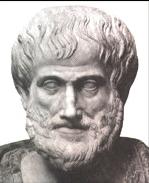Aristotle

Aristotle (384-322 BC), author of philosophical works including The Categories, which is his examination of the definition of the terms used in the process of logic and reasoning;
"Things are said to be named 'equivocally' when, though they have a common name, the definition corresponding with the name differs for each. Thus, a real man and a figure in a picture can both lay claim to the name 'animal'; yet these are equivocally so named, for, though they have a common name, the definition corresponding with the name differs for each. For should any one define in what sense each is an animal, his definition in the one case will be appropriate to that case only."
Whereas Plato said that the universal is found separately from things, the third of the three main Greek philosophers, Artistotle developed his own philosophy in deductive logic, trying to bring order to chaos; "the science of the universal essence of that which is actual". That being, reality, in the realm of the physical, is acquired through experience, that the universal is found within things. Though only a small percentage of the Aristotelian writings survive, and many appear as works in progress and acroatic papers, his meticulous studies and teachings in such topics as aesthetics, biology, ethics, government, logic, morality, physics, and poetry greatly influenced Western philosophical and scientific thought.
| Books | Author |
|---|---|
| The Poetics | Aristotle |
| The Categories | Aristotle |
| The Athenian Constitution | Aristotle |
| Politics | Aristotle |
| Ethics | Aristotle |